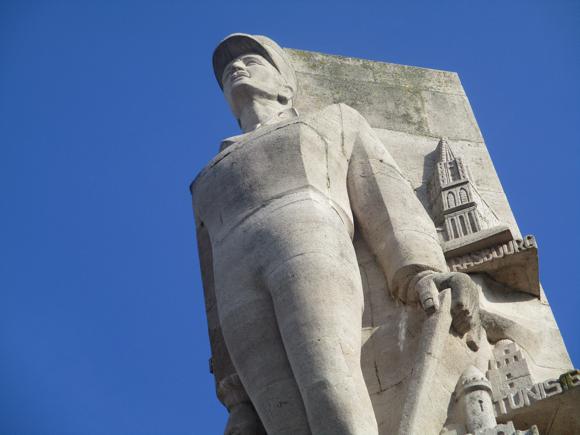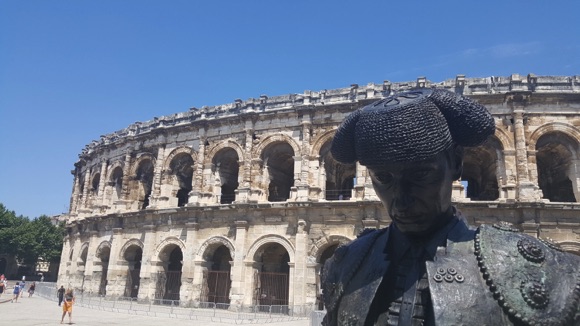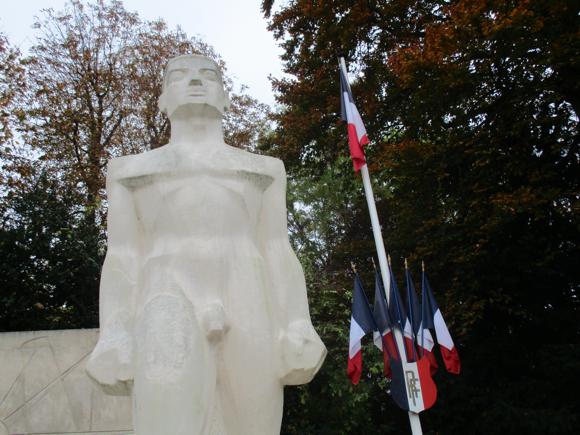Teams, tales and tips – a guide to the local game
At the northern tip of Corsica, looking out onto the isle of Elba where Napoleon was exiled, Bastia is far closer to the Italian mainland than it is to France.
Down on the south-west coast, looking towards Marseille, Ajaccio has the kudos of being the birthplace of Napoleon and the capital of Corsica – but Bastia has always been the focal point for football on the island.
Far more than the intense (and downright hostile) rivalry with Ajaccio, Bastia bears its biggest grudge with clubs from the French mainland, most notably Nice and, to a lesser extent, Marseille, Monaco and Paris Saint-Germain.

Currently Corsica’s only representatives in Ligue 1, SC Bastia, I Turchini (‘The Blues’) in the local language, count many nationalists among their island-wide fan base. With the moor’s head symbol of Corsica on the club badge, The Blues embody this ferociously proud Mediterranean outpost.
But it’s not all chip-on-the-shoulder nationalism. International stars of the quality of Dragan Džajić and Johnny Rep, goalscorers for Yugoslavia and Holland at the 1974 World Cup finals, were attracted by the sunny lifestyle on this holiday island. In this golden era, Bastia captured the public imagination by reaching the UEFA Cup Final of 1978. Jacques Tati even made a film about the club’s exploits, ‘Forza Bastia’.
Just as Corsican separatism was becoming more widespread and extreme, so Bastia united the island, even garnered support across France.

But Bastia is also known for another highlight fixture at the Stade Armand-Cesari, universally known as Furiani after the community south of Bastia it sits in. Waterlogged and practically unplayable for the first, home leg against PSV Eindhoven in the 1978 final, the Furiani was again expecting a bumper crowd for the French Cup semi-final against then dominant Marseille in 1992. Expectant but not prepared – shortly before kick-off, a temporary stand collapsed, causing the death of 18 people and injury to 2,300 more.
Despite fielding players of the quality of Michael Essien and Alex Song, who both started their careers on Corsica, Bastia have since limited their silverware to a Championnat National third-division title in 2011 and a Ligue 2 one a year later.
Since 2003, the honour of Corsican champions –decided on who finishes highest in the French League – has fallen more often to AC Ajaccio. Before 1959, a Corsican League, overseen by the Bastia-based Ligue corse de football, produced the title-winner. (After 1959, the island’s amateur league comprised village teams and the reserve sides of Corsica’s bigger clubs.)

Of the five clubs recognised as champions since 1919, three come from Bastia. SCB, top dogs continuously from 1971 to 2003, weren’t even the best team in town in the early 1920s. Back then, CA Bastia, formed by local moneymen, outshone working-class city rivals SCB, even though the club had only been founded in 1920.
A rare team to play in all black – hence their nickname Les Noirs – CA Bastia recently left the confines of Corsican soccer to climb up the French league pyramid. Gaining promotion from the third-flight National in 2013, Les Noirs were even the whipping boys for a solitary season in Ligue 2, playing their home games at SCB’s Furiani.
Now safely back in the National, Les Noirs are also back at the 2,000-capacity Stade Erbajolo, rebuilt in 2007 and 2011. It’s a short walk from Erbajolo station, served by hourly stopping trains on the Chemin de Fer de la Corse line from main Bastia station seven stops/7mins away. From Erbajolo station, head over the main road and down Pastoreccia, bearing left after 300 metres.
Also honoured as Corsican champions six times between 1951 and 1960, FCC Bastia no longer operate, any trace of their existence lost since blipping out of the island’s amateur division in the early 1980s.
Getting Around
Arriving in town, local transport and timings
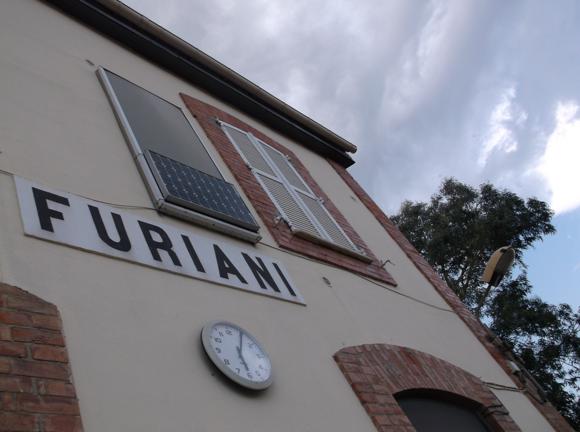
Bastia’s Poretta Airport is 17km (11 miles) south-east of town, linked by shuttle bus to Bastia train station (35min journey time, €9) every 45mins-2hr. Corsica Taxis (+33 4 95 36 04 65) charges €48 to town, €66 after 7pm and on Sun/hols.
Bastia station is a steepish 10min walk up avenue Pierre Giudicelli/Maréchal Sebastiani from the port by the city centre. Corsica Ferries runs one service a day each from Nice (journey time 5hrs) and Toulon (10hrs), plus an overnight from either port according to schedule. Seat-only tickets start at €15-€20 one-way, cabins from around €50.
La Méridionale and recently rebranded Corsica linea provide three to four services a week from Marseille, 12-13hrs, foot passenger fares from €35.
All times and prices are available at Direct Ferries.
Downtown Bastia is walkable – the Bastia Bus network (single ticket €1.30 on board) serves outlying areas. The stadium at Furiani is best accessed by hourly Chemin de Fer de la Corse train from Bastia station 10mins away.
Taxis Bleus Bastiais (+33 4 95 32 70 70) is a local cab company.
Where to Drink
The best pubs and bars for football fans





Everywhere you’ll see signs for Pietra, the golden beer brewed right next to the Furiani stadium – chestnut flour gives the ale its head and colour.
An atmospheric place to sample it is the Vieux Port, a 10min walk south of the modern-day ferry terminal, lined with restaurants and football-focused Le Goëland, a cosy terrace drinkerie flying the flags of SC Bastia. A big screen is put up outside on match nights.
In the warren of streets behind it, Le Penalty is a pleasant place for a drink on a shaded terrace. Also on the waterfront, Le Petit Palace is an old Bastia bar with TV sports, holding out against the growing number of neighbouring seafood restaurants along quai des Martyrs de la Libération.
Signposted nearby, O’Connor’s is pretty much the only Irish-style bar in town – though don’t expect a homely tavern of carved wood, more a late-opening music-friendly drinking spot.




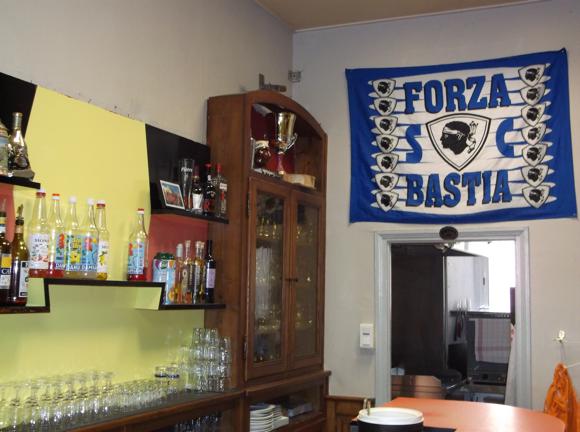


On the main drag parallel to the waterfront, Café de la Place is where Bastia meets and greets, with huge screens erected above the busy terrace for big tournaments. A few doors down, Les Palmiers is another classic old café, and long-term meeting place of the SC Bastia social club – in fact, SCB were founded here in 1905.
Nearer to the ferry terminal, Le Majestic at the junction of avenue Émile Sari and rue du Commandant Luce de Casablanca is a bar-brasserie with recommendable adjoining restaurant, unabashed in its support for SC Bastia. Close by on Émile Sari, Café L’Umbria is a little sports betting bar full of local football gossip.
Fans also gather at Le Terminus, the bar attached to Bastia’s train station, done out with SCB flags and old drink ads, the perfect spot for a welcome or farewell Pietra.
Where to stay
The best hotels for the stadium and in city centre


Bastia Tourisme has an online reservation service for hotels. Note that rates in this holiday destination rise in high season, but not considerably.
There are no hotels around the stadium, beyond the city limits. Halfway between Furiani and downtown Bastia, the Sud Hôtel is friendly, comfortable and affordable, and only a 5min walk from Bassanese train stop on the line to the stadium. It has a restaurant, too, and half-board deals.
Mid-range hotels surround the port and rail station, where the Hôtel Les Voyageurs is a tastefully decorated three-star with 23 rooms, also convenient for stadium access by train.





Nearer the harbour, Bastia Le Riviera Centre Port is a more basic two-star completely renovated in 2013.
Between port and station, you’ll find the standard two-star Hôtel Napoléon, the three-star Hôtel Bonaparte and the affordable Hôtel Univers.
Further along the waterfront, the Posta Vecchia could do with a little modernisation itself, but should do at a pinch. Rooms range from ‘economic’ to sea-view.


